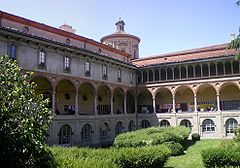Brad Wray presents his paper on The Epistemic Significance of the Size of Research Teams
Reassessing Scientific Collaboration: A Final Workshop, Museo Nazionale Scienza e Tecnologia Leonardo da Vinci, Milan, 28 October 2021

About the workshop
Collaborative approach to research has become crucial in order to attain substantial results in practically all domains of natural sciences. Correspondingly, the notion of scientific collaboration has raised much interest among scholars of different disciplines and background, coming from domains as diverse as social epistemology and sociology of science, computer science, science policy, cognitive science and philosophy of action, history and philosophy of science. Indeed, there seems to be many cross-disciplinary questions that can only be answered with contributions from different areas — E.g., who is entitled to be a collaborator in a certain common effort and who is not? Are there many kinds of collaboration, and how could we distinguish among them? Why is collaboration more popular in certain fields than in others? Does only material/technical/economic advantages matter to collaboration, or are there cognitive benefits? And, of course, many other interesting issues can be raised.
This interdisciplinary workshop brings together scientists from different areas, philosophers and historians of science, and social scientists. It aims to discuss the real collaborative practices in which scientists have been or are currently involved. It encourages scientists to reflect upon their actual practices and dealing with questions and ideas coming from different disciplines or specialties, while offering to historians, philosophers, and social scientists novel and fresh insights as well as an inside view for further research.
